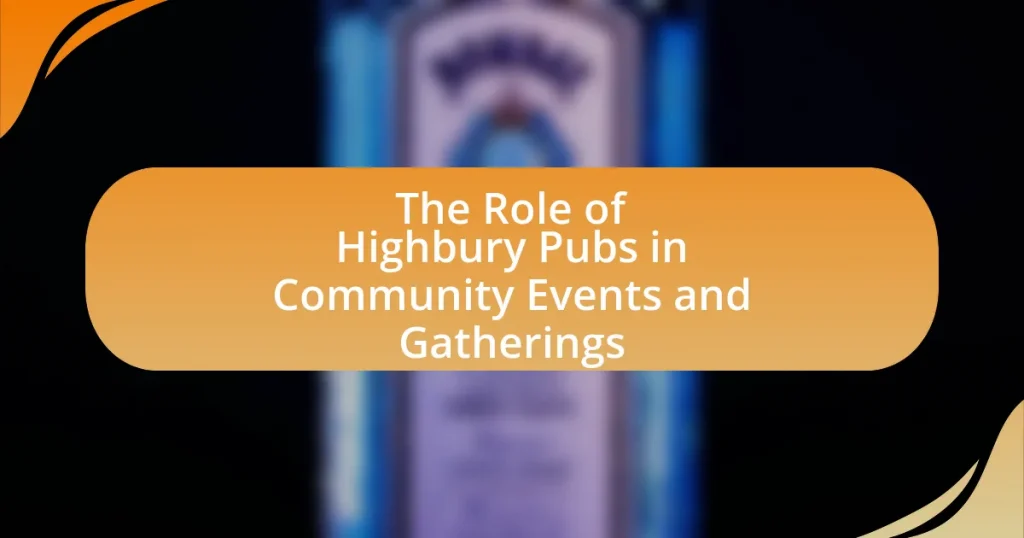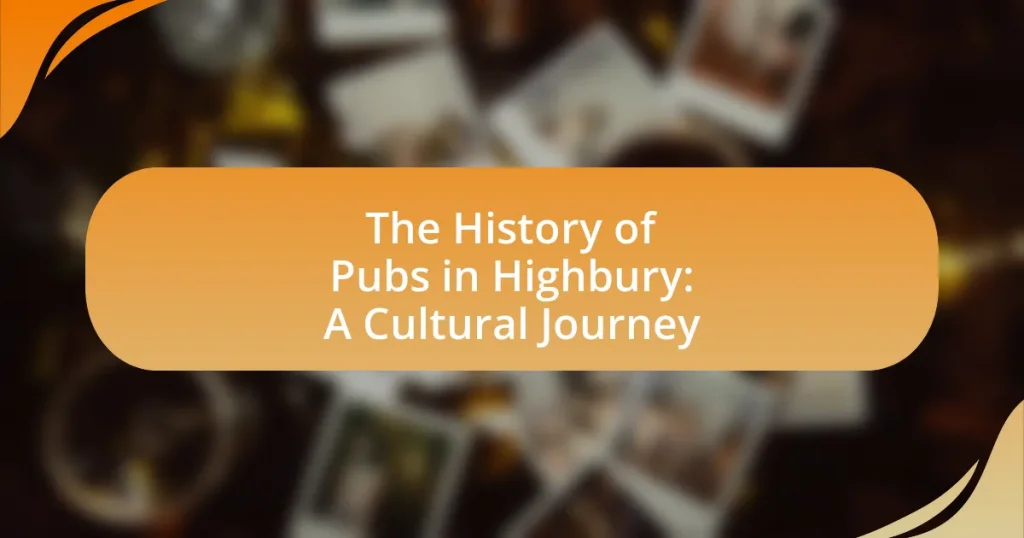Highbury’s iconic pubs are significant historical and cultural landmarks that reflect the area’s evolution since the 19th century. Established as community hubs, these pubs, such as The Twelve Pins and The Highbury Barn, showcase Victorian architectural styles and have adapted over time to meet changing social dynamics. The article explores the historical significance, architectural evolution, and cultural impact of these establishments, highlighting notable pubs and their roles in community life. Additionally, it discusses how local events and traditions shape pub culture, the community initiatives supported by these venues, and ways for visitors to engage with Highbury’s rich pub history.
What is the history of Highbury’s iconic pubs?
Highbury’s iconic pubs have a rich history that reflects the area’s social and cultural evolution. Established in the 19th century, many of these pubs, such as The Twelve Pins and The Highbury Barn, served as community hubs for local residents and football fans, particularly during the rise of Arsenal Football Club. The architectural styles of these pubs often showcase Victorian influences, with some buildings dating back to the 1800s, highlighting their historical significance. Over the years, Highbury’s pubs have adapted to changing social dynamics, maintaining their relevance by offering diverse experiences, from traditional ales to modern dining options, thus preserving their status as integral parts of the community.
How did Highbury’s pubs evolve over the decades?
Highbury’s pubs evolved significantly over the decades, transitioning from traditional establishments to modern venues that cater to diverse tastes. In the early 20th century, pubs primarily served local communities, focusing on beer and simple food, reflecting the working-class culture of the area. By the 1980s, many pubs began to adapt to changing social dynamics, introducing a wider range of beverages, including craft beers and cocktails, as well as food menus that featured gourmet options. The late 20th and early 21st centuries saw a further transformation with the rise of gastropubs, which combined high-quality dining with a pub atmosphere, appealing to a broader demographic. This evolution was influenced by urban development, demographic shifts, and changing consumer preferences, leading to a vibrant pub scene that now includes a mix of traditional and contemporary styles.
What significant events influenced the development of these pubs?
The development of Highbury’s iconic pubs was significantly influenced by the Industrial Revolution, which led to urbanization and increased population density in the area. This surge in population created a demand for social spaces, resulting in the establishment of numerous pubs to cater to the local community. Additionally, the introduction of the Beerhouse Act in 1830 allowed for easier licensing of pubs, further contributing to their proliferation. The two World Wars also impacted pub culture, as they served as gathering places for soldiers and communities during and after the conflicts, solidifying their role in social life. These events collectively shaped the landscape of Highbury’s pubs, making them integral to the area’s social fabric.
How did architectural styles change in Highbury’s pubs?
Architectural styles in Highbury’s pubs evolved significantly from the Victorian era to contemporary designs. Initially, many pubs featured ornate Victorian architecture characterized by intricate brickwork, large windows, and decorative elements, reflecting the period’s emphasis on craftsmanship. As the 20th century progressed, the architectural focus shifted towards simpler, functional designs, often incorporating modern materials like steel and glass, which aimed to create open, inviting spaces. This transition is evident in the transformation of traditional pub layouts into more casual, multifunctional environments that cater to diverse social activities, aligning with changing consumer preferences and lifestyles.
Why are Highbury’s pubs considered iconic?
Highbury’s pubs are considered iconic due to their rich history, unique architectural styles, and cultural significance within the community. Many of these establishments have been in operation for over a century, serving as social hubs that reflect the area’s evolution. For instance, the iconic Highbury Barn, established in the 19th century, showcases Victorian architecture and has been a gathering place for locals, contributing to its status. Additionally, pubs like The Twelve Pins and The Drayton Park have become landmarks, known for their vibrant atmospheres and connections to local sports, particularly Arsenal Football Club. This blend of historical relevance and community engagement solidifies their iconic status in Highbury.
What unique features distinguish Highbury’s pubs from others?
Highbury’s pubs are distinguished by their rich historical significance, unique architectural styles, and strong community ties. Many of these establishments, such as The Black Horse and The Old Dairy, feature Victorian-era designs that reflect the area’s heritage. Additionally, Highbury’s pubs often host local events and support neighborhood initiatives, fostering a sense of belonging among patrons. This combination of historical charm and community engagement sets Highbury’s pubs apart from others in London.
How have cultural shifts impacted the significance of these pubs?
Cultural shifts have significantly altered the significance of Highbury’s iconic pubs by transforming them from traditional social hubs into multifunctional spaces that cater to diverse community needs. For instance, the rise of craft beer culture has led to a focus on quality and local sourcing, prompting pubs to adapt their offerings and ambiance to attract a younger, more discerning clientele. Additionally, changing social norms around drinking and the increasing popularity of alternative social venues have compelled these establishments to diversify their services, incorporating food offerings, live music, and community events to maintain relevance. This evolution reflects broader societal trends, such as the emphasis on inclusivity and the desire for unique experiences, which have reshaped the role of pubs in the community.

What are some notable pubs in Highbury?
Some notable pubs in Highbury include The Highbury Barn, The Drayton Park, and The Black Horse. The Highbury Barn is known for its traditional British pub atmosphere and a diverse selection of ales. The Drayton Park, located near the Emirates Stadium, offers a vibrant setting for sports fans. The Black Horse features a spacious beer garden and a menu that highlights local ingredients. These pubs are recognized for their unique character and contributions to the local community.
Which pubs have the most historical significance?
The pubs with the most historical significance in Highbury include The Black Horse, The Old Red Lion, and The Highbury Barn. The Black Horse, established in the 18th century, is notable for its connections to local history and community events. The Old Red Lion, dating back to 1839, has hosted numerous theatrical performances and is recognized for its role in London’s cultural scene. The Highbury Barn, originally a coaching inn, has been a focal point for social gatherings since the 19th century. Each of these pubs reflects the rich heritage of Highbury and contributes to its historical narrative.
What stories are associated with these notable pubs?
Highbury’s notable pubs are associated with rich histories and intriguing stories. For example, The Black Horse, established in the 19th century, is known for its connection to local football culture, serving as a gathering place for fans of Arsenal FC. The Old Dairy, once a dairy processing facility, has transformed into a vibrant pub that reflects the area’s industrial past while hosting community events. Additionally, The Highbury Barn has a history dating back to the 18th century, where it served as a coaching inn, providing travelers with rest and refreshments. These pubs not only offer drinks but also serve as historical landmarks that embody the cultural evolution of Highbury.
How have these pubs maintained their relevance over time?
These pubs have maintained their relevance over time by adapting to changing social trends and community needs. For instance, many have diversified their offerings by incorporating craft beers, hosting live music events, and providing food menus that cater to modern dietary preferences. Historical records indicate that pubs like The Black Horse have been pivotal in community engagement, hosting events that foster local culture and social interaction. Additionally, renovations and updates to the ambiance have kept these establishments appealing to both long-time patrons and new visitors, ensuring their continued significance in the local landscape.
What role do these pubs play in the community?
Pubs play a vital role in the community by serving as social hubs that foster connections among residents. They provide a space for people to gather, share experiences, and build relationships, contributing to a sense of belonging. Historically, pubs have been central to community life, often hosting events, supporting local charities, and promoting cultural activities, which enhances community cohesion. For instance, many pubs in Highbury have a long-standing tradition of hosting quiz nights and live music, which not only entertain but also engage the local population, reinforcing social ties.
How do local events and traditions influence pub culture in Highbury?
Local events and traditions significantly shape pub culture in Highbury by fostering community engagement and creating unique social experiences. For instance, events like the Highbury Festival and local sports matches encourage residents to gather in pubs, enhancing their role as social hubs. Additionally, traditional celebrations such as Christmas and local cultural festivals often lead to themed events and promotions in pubs, attracting patrons and reinforcing local identity. This interaction between local customs and pub activities not only boosts business but also strengthens community ties, making pubs integral to Highbury’s social fabric.
What community initiatives are supported by Highbury’s pubs?
Highbury’s pubs support various community initiatives, including local charity events, sports sponsorships, and cultural festivals. These establishments often host fundraisers for nearby schools and community organizations, contributing to local development. For instance, pubs in Highbury frequently collaborate with local sports teams, providing sponsorships that enhance community engagement and promote healthy activities. Additionally, they participate in cultural events that celebrate the area’s heritage, fostering a sense of community and belonging among residents.
How can one explore Highbury’s pub history today?
One can explore Highbury’s pub history today by visiting local pubs that have historical significance, such as The Highbury Barn, which dates back to the 19th century and has retained its original charm. Engaging in guided walking tours specifically focused on Highbury’s pub culture provides insights into the area’s rich drinking heritage, highlighting notable establishments and their stories. Additionally, researching online resources, such as local history websites and pub heritage groups, can offer detailed accounts and historical context about Highbury’s pubs, including their architectural features and the role they played in the community.
What tours or resources are available for pub enthusiasts?
Pub enthusiasts can explore a variety of tours and resources focused on Highbury’s iconic pubs. Guided walking tours, such as the Highbury Pub Crawl, offer insights into the history and architecture of notable establishments, often led by local historians or pub owners. Additionally, resources like the “Pubs of Highbury” website provide detailed information on pub histories, reviews, and events. These tours and resources enhance the understanding of Highbury’s pub culture, showcasing its significance in the community and its evolution over time.
How can visitors engage with the history of Highbury’s pubs?
Visitors can engage with the history of Highbury’s pubs by participating in guided historical tours that highlight significant establishments and their contributions to local culture. These tours often include storytelling about the pubs’ origins, notable patrons, and architectural features, providing context and depth to the experience. For example, the Highbury Barn, established in the 19th century, is often featured for its role in the community and its unique Victorian architecture. Additionally, visitors can explore pub archives or local history exhibitions that showcase photographs, artifacts, and documents related to the pubs’ past, further enriching their understanding of Highbury’s social history.
What are the best practices for experiencing the local pub culture?
To experience the local pub culture effectively, engage with the community by participating in pub events and conversations with locals. This interaction fosters a deeper understanding of the pub’s role in the community and its historical significance. Visiting during peak hours, such as evenings or weekends, allows for a vibrant atmosphere where you can observe and partake in traditional activities like quiz nights or live music, which are common in many pubs. Additionally, trying local beers or signature dishes enhances the experience, as these offerings often reflect the region’s heritage. Engaging with staff about the pub’s history can provide insights into its cultural importance, making your visit more enriching.
What tips can enhance a visit to Highbury’s iconic pubs?
To enhance a visit to Highbury’s iconic pubs, patrons should consider visiting during off-peak hours to enjoy a more relaxed atmosphere and better service. This approach allows for a deeper appreciation of the pub’s historical significance, as many of these establishments have rich stories and unique architectural features dating back to the 19th century. Engaging with staff about the pub’s history can provide valuable insights, as many employees are knowledgeable about the local heritage and can share anecdotes that enrich the experience. Additionally, sampling local ales or traditional dishes can further immerse visitors in the local culture, as Highbury is known for its vibrant pub scene that reflects the area’s community spirit.


